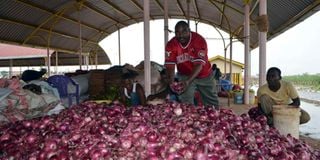Kenya and Tanzania trade now EAC’s fastest-growing

Traders prepare onions at the Taveta market along the Kenya-Tanzania boarder on May 15, 2015.
Trade between Kenya and Tanzania is now the fastest-growing in the region, new data shows, underpinning the gains of ongoing elimination of non-tariff barriers.
Fresh statistics reveal that the pace of growth in both import and export trade between the two nations was the fastest last year—dwarfing performance between Kenya and other East Africa Community (EAC) partners including Uganda, which has traditionally held the top spot and Nairobi’s main business partner in the region.
Data by the Economic Survey 2022 shows that the value of Kenya’s exports to Tanzania jumped 43.39 percent to Sh45.6 billion last year compared to the previous year. Tanzania’s exports to Kenya, on the other hand, grew 95.3 percent last year—nearly double-to Sh54.47 billion last year.
Comparatively, the value of Kenya’s exports to its main market Uganda grew by 26.92 percent to Sh91.65 billion last year. The value of Kenya’s imports from Uganda expanded by 42.72 percent to Sh12.36 billion in 2021.
Performance of Kenya-Tanzania trade comes in the wake of improved relations between the pair after years of tiffs that at one point, resulted in retaliatory measures such as trade bans.
Kenya mainly imports cereals, wood, and edible vegetables from Tanzania and it exports pharmaceutical products, plastics, iron, and steel to the neighbouring State.
President Uhuru Kenyatta and his Tanzanian counterpart, Samia Suluhu ended persistent strained trade ties between the two largest economies in the six-nation EAC bloc, which have for years, hindered the smooth flow of goods and services through the borders.
In May last year, President Samia and Kenyatta at a meeting in Nairobi agreed on a series of measures including eliminating over 14 identified non-tariff barriers in six months.
Kenyan manufacturers had in recent years protested “discriminative” duties and non-tariff barriers such as double inspection of goods for standards by Tanzania, which had made supplies such as meat, milk, and related products to the neighbouring country uncompetitive.
The protectionist fees, Kenyan manufacturers argued, were against the EAC Common Market Protocol, which requires member-States to open up borders to facilitate the free movement of goods, labour, services as well as capital.





